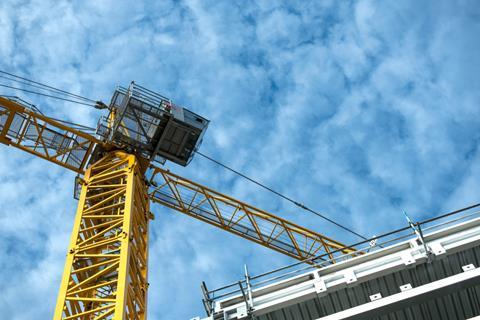Housing also returns to growth as market conditions improve
Construction activity accelerated last month as a rebound in commercial jobs drove the fastest growth in workloads in two years, according to a bellwether index.
The S&P Global UK construction Purchasing Managers’ Index (PMI) rose to 54.7 in May, up from 53 in April, the third consecutive month that the figure stood above the no-change mark at 50.
For the first time since May 2022, activity increased in all three monitored sectors as rising workloads prompted renewed expansion in purchasing activity and employment.
Housing activity returned to growth following a period of contraction, while civil engineering continued growing at a steady pace.

But commercial work was the standout sector with activity accelerating to a two-year high.
The overall figures were the fourth consecutive month of increasing activity and the fastest for a year, with firms noting improved supply chain conditions and the recommencement of previously delayed jobs.
Companies also found only a marginal increase of input costs in May with the rate of inflation being the softest in the last five months.
Fraser Johns, finance director at contractor Beard, said the figures made “fantastic reading”.
“From our viewpoint, clients certainly haven’t been shy in committing to new projects, and both regional and national frameworks continue to provide us with a healthy pipeline of new work,” Johns said.
“We are really encouraged by the prospects for the remainder of the year, particularly given the momentum we are seeing in the commercial space.”
Aecom head of cost management Brian Smith said the full quarter of growth had put construction on a “more stable footing heading into the key summer months”.
“There is further room for optimism as well. An early General Election reduces the risk of market inertia and will almost certainly embolden decision-making in the second half of the year,” he said.
“With the rate of inflation reducing back to normal levels, the prospect of falling interest rates should also breathe much-needed wind into the sails of housebuilders.”
Jordan Smith, technical director at consultant Thomas & Adamson, added that the figures were encouraging but there was “a lot going on beneath the surface”.
We’re certainly beginning to see more stability and signs of future growth. However, the market is still challenging, with a number of projects either being paused, pushed out, or held at early design stages because of issues relating to cost, viability, and the level of returns on investment.
“Cost increases are stabilising, but they are still on the rise, driven by material shortages, a tight labour market, and limited supply chain capacity. Careful consideration towards cost management and the overall approach to projects remains key to mitigate risk.”


























No comments yet